Early R&B Vocal Groups
Mills
Brothers
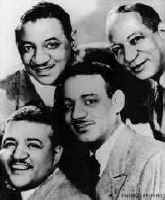
Clockwise from top left: Herbert Mills,
John Mills, Donald Mills, Harry Mills
The Mills Brothers were not only the first black group to have
wide appeal among whites, they were the most successful.
Members:
John Mills
Herbert Mills
Harry Mills
Donald Mills
The Mills Brothers were a popular middle of the
road vocal group in the 1930s. Billed as "Four Boys and a
Guitar," they were experts at imitating instruments
including trumpet, trombone, tuba and string bass. With the
backing of just a guitar, they simulated a full band and amazed
listeners. The Mills Brothers (Herbert, Harry, Donald and John
Jr.) started out singing in vaudeville and tent shows, were
featured on a radio show for ten months in Cincinnati, arrived in
New York and by the end of 1931 were an instant hit. They
recorded frequently throughout the decade, made appearances in
many films (including 1932's Big Broadcast) and recorded with
Bing Crosby, the Boswell Sisters and Duke Ellington. John Jr.'s
death in 1935 was a tragic loss although John Sr. effectively
took his place. However by 1942 with their hit "Paper
Doll," the old sound gave way to a more conventional pop
setting.
Mills
Brothers
Ink
Spots
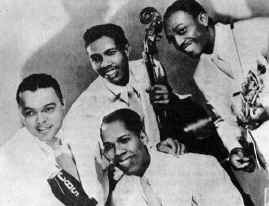
Center: Billy Kenny
Left to Right: Orville Jones, Ivory Watson, Charlie Fuqua
Though the Ink Spots enjoyed the greatest popularity year before
rock and roll came into being, their vocal style eas the
precursor to the doo wop groups of the 50s
Members:
Bill Kenny Lead Tenor
Ivory "Deek" Watson - SEcond Tenor
Jerry Daniels - First Tenor
Charlie Fuqua - Baritone
Orville "Hoppy" Jones - Bass
The original group was formed in Indianapolis,
Indiana in the late twenties when Jerry Daniels, Orville Jones,
Charles Fuqua and and Ivory Matson met in Indianapolis. After
moving to New York in the early thirties they changed their name
from from, King, Jack and the Jesters to The Ink Spots. Soon
after signing with Decca Records in 1935 Billy Kenny replaced the
groups lead singer who had left. Kenny's quavering
high tenor presaged street corner leads that were to come
and was backed by flawless sweet harmonies. In 1939 the
group released "If I Didn't Care" their first million
selling record. Other hits were "My Prayer," "We
Three," "Maybe," "Whispering Grass,"
"To Each His Own," and "I Don't Want To Set The
World On Fire." The last Ink Spots hit was
1948s "To Each His Own".
The Ink Spots were one of the most successful
black acts of the 1940sand inspired younger groups that took
their sound into a R&B direction.
The Ink Spots were inducted into the Rock and Roll
Hall of Fame in 1989 an early influence.
Vocal
Group Hall of Fame: The Ink Spots
Original
Ink Spots
Ink Spots
Ravens

Left Clockwise: Jimmy Ricks, Warren
Scuttles, Maithine Marshall and Len Puzey
The popularity of the Ravens spanned more than two decades
Members:
Maithe Marshall - lead
Len Puzey - second tenor
Warren Scuttles - baritone
Jimmy Ricks - replaced by Tommy Evans
The Ravens formed in New York in 1945 were an early R&B
vocal group that sang a wide range of material. They were one of
the first groups to feature a bass voice as a lead, probably the
first to feature a lead falsetto and the first to choreograph
their act. With a smooth harmony like the Mills Brothers
recorded for Hub Records "My Sugar Is So Refined"
in 1946. Shortly thereafter, Maithe Marshall, whose lead falsetto
became the group's trademark joined The Ravens. Their first big
hits "Ol' Man River" and "Write Me A Letter"
were recorded in 1947. "White Christmas" was a major
hit in 1948. The groups next hit was "I Don't Have To Ride
No More" in 1950. "Count Every Star" of the same
year,with full range vocal backing highlighted by wordless vocal
bass lines and high falsetto constitute the virtual definition of
doo wop. 1952 to saw their last hit "Rock Me All
Night".
Vocal
Group Hall of Fame: The Ravens
Five
Keys
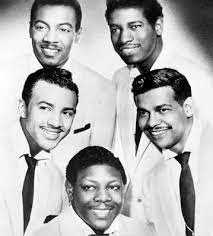
Top: Rudy West
Center left to right: Ripley Ingram, Dickie Smith, Maryland
Pierce, Bernie West
Bottom: Joe Jones
The Five Keys were one of the most popular, influental
and beautiful sounding R&B groups of the 50s.
Members:
Rudy West - lead
Riply Ingram - tenor
Dickie Smith - second tenor
Maryland Pierce - baritone
Bernie West - bass
Artist Biography by Jim Dunn
The Five Keys are generally regarded by aficionados of 1950s
R&B vocal group harmony as one of the finest groups to ever
record in thisgenre. They are best known for their Capitol
recordings of "Wisdom ofa Fool," "Close Your
Eyes," "Ling Ting Tong," and "Out of Sight,
Outof Mind." But in collectors' circles their earlier
recordings forAladdin such as "My Saddest Hour,"
"Glory of Love," and "Red Sails inthe Sunset"
are even more highly revered and sought after. The group
originally consisted of two sets of brothers; Rudy and Bernie
West andRaphael and Ripley Ingram all hailing from Newport News,
VA, part ofthe "Hampton Roads" area. This region had a
rich history of high-caliber vocal music and had previously
spawned great vocal ensembles like the Golden Gate Quartet and
Norfolk Jazz Quartet. The West and Ingram brothers initially took
on the name the Sentimental Four and soon decided to show off
their talents by entering a local amateur program at the
Jefferson Theater. After winning three consecutive weeks of
amateur contests at the Jefferson, they were invited to perform
at the prestigious Apollo Theater in New York City, where they
also won.
This led to subsequent engagements at the Royal and Howard
Theaters. As the group established their reputation along the
Eastern Seaboard, they were noticed by Eddie Mesner, owner of the
California-based Aladdin Records, who signed them to a recording
contract. About this time, Raphael went into the army and was
replaced by Maryland Pierce (formerly of the Avalons). Also added
was another singer, Dickie Smith, and a sixth man, piano player
Joe Jones. Reflecting the personnel changes, their name was
changed from the Sentimental Four to the Five Keys. The Keys
toured both the East and West Coasts and their Aladdin songs were
recorded in New York and Los Angeles. Some of their approximately
17 Aladdin releases in the early '50s consisted of "Glory of
Love," "How Long," "Someday Sweetheart,"
"Red Sails in the Sunset," and "Yes Sir, That's My
Baby" with Rudy West and Dickie Smith on leads; and "My
Saddest Hour" and "Serve Another Round" with
Maryland Pierce on lead.
In 1953, both Rudy and Dickie entered the army and were replaced
by Ramon Loper and Ulysses Hicks. By mid-1954, the Keys' contract
with Aladdin was expiring and their last Aladdin release,
"Deep in My Heart," was reviewed in June of that year.
In July of 1954, the Five Keys found themselves in the RCA
studios, where they recorded four tracks. Two remained
unreleased, and "Lawdy Miss Mary" backed with
"I'll Follow You" were issued in August 1954 on RCA's
subsidiary Groove label. The Keys' manager, Saul Richfield, must
have been working very hard for his group at this time, for on
August 29, 1954, Capitol announced that they had signed the Five
Keys. RCA immediately stopped production of the Groove release
and it is now the rarest of the Five Keys recordings. Now
recording for Capitol, the Five Keys released "Ling Ting
Tong," with Pierce on lead. The record was successful enough
to eventually land them a spot of the Ed Sullivan TV show. When
Hicks died suddenly in 1954, and before Rudy returned home
from Artist Biography by Jim Dunn The Five Keys are
generally regarded by aficionados of 1950s R&B vocal group
harmony as one of the finest groups to ever record in this genre.
They are best known for their Capitol recordings of "Wisdom
of a Fool," "Close Your Eyes," "Ling Ting
Tong," and "Out of Sight, Out of Mind." But in
collectors' circles their earlier recordings for Aladdin such as
"My Saddest Hour," "Glory of Love," and
"Red Sails in the Sunset" are even more highly revered
and sought after. The group originally consisted of two sets of
brothers; Rudy and Bernie West and Raphael and Ripley Ingram all
hailing from Newport News, VA, part of the "Hampton
Roads" area. This region had a rich history of high-caliber
vocal music and had previously spawned great vocal ensembles like
the Golden Gate Quartet and Norfolk Jazz Quartet. The West and
Ingram brothers initially took on the name the Sentimental Four
and soon decided to show off their talents by entering a local
amateur program at the Jefferson Theater. After winning three
consecutive weeks of amateur contests at the Jefferson, they were
invited to perform at the prestigious Apollo Theater in New York
City, where they also won.
This led to subsequent engagements at the Royal and Howard
Theaters. As the group established their reputation along the
Eastern Seaboard, they were noticed by Eddie Mesner, owner of the
California-based Aladdin Records, who signed them to a recording
contract. About this time, Raphael went into the army and was
replaced by Maryland Pierce (formerly of the Avalons). Also added
was another singer, Dickie Smith, and a sixth man, piano player
Joe Jones. Reflecting the personnel changes, their name was
changed from the Sentimental Four to the Five Keys. The Keys
toured both the East and West Coasts and their Aladdin songs were
recorded in New York and Los Angeles. Some of their approximately
17 Aladdin releases in the early '50s consisted of "Glory of
Love," "How Long," "Someday Sweetheart,"
"Red Sails in the Sunset," and "Yes Sir, That's My
Baby" with Rudy West and Dickie Smith on leads; and "My
Saddest Hour" and "Serve Another Round" with
Maryland Pierce on lead.
In 1953, both Rudy and Dickie entered the army and were replaced
by Ramon Loper and Ulysses Hicks. By mid-1954, the Keys' contract
with Aladdin was expiring and their last Aladdin release,
"Deep in My Heart," was reviewed in June of that year.
In July of 1954, the Five Keys found themselves in the RCA
studios, where they recorded four tracks. Two remained
unreleased, and "Lawdy Miss Mary" backed with
"I'll Follow You" were issued in August 1954 on RCA's
subsidiary Groove label. The Keys' manager, Saul Richfield, must
have been working very hard for his group at this time, for on
August 29, 1954, Capitol announced that they had signed the Five
Keys. RCA immediately stopped production of the Groove release
and it is now the rarest of the Five Keys recordings. Now
recording for Capitol, the Five Keys released "Ling Ting
Tong," with Pierce on lead. The record was successful enough
to eventually land them a spot of the Ed Sullivan TV show. When
Hicks died suddenly in 1954, and before Rudy returned home from
induction ceremony. This was their first time together in 40-plus
years and would be the last time they would all take to the stage
as a group. Rudy West passed away on May 14, 1998. His last
performance was on April 18,1998, at the Nassau Coliseum on Long
Island, NY. Even at that point in time, his voice was still
magnificent, and his phrasing impeccable. The audience was
justifiably thrilled at what would be the final performance of
this legendary R&B artist. Ripley Ingram had previously
passed away. The surviving original members are Bernie West,
Dickie Smith, and Maryland Pierce. Fortunately, most of the Five
Keys extensive recorded output is now available on various CDs.
Vocal
Group Hall of Fame: The Five Keys
"5" Royales
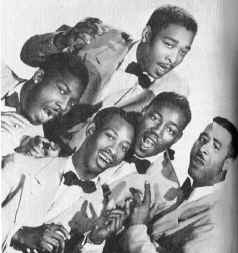
Top: Lowman Pauling
From left to right: Obediah Carter, Johnny Tanner, Clarence
Pauling, Johnny Moore
The "5" Royales" were a raunchy blues group,
singing songs with risque double entendres like The
Laundromat Blues.
Members:
Johnny Tanner
Otto Jefferies - tenor
William Samuels - tenor
Clarence Pauling - baritone
Lowman Pauling - bass
Artist Biography by Richie Unterberger
The "5" Royales were a relatively unheralded, but
significant, link between early R&B and early soul in their
combination of doo wop, jump blues, and gospel styles. Their
commercial success was relatively modest -- they had seven Top
Ten R&B hits in the 1950s, most recorded in the span of
little over a year between late 1952 and late 1953. A few of
their singles would prove extremely popular in cover versions by
other artists, though -- James Brown and Aretha Franklin tore it
up with "Think," Ray Charles covered "Tell the
Truth," and the Shirelles (and later the Mamas & the
Papas) had pop success with "Dedicated to the One I
Love." Almost all of their material was written by guitarist
Lowman Pauling, who influenced Steve Cropper with his biting and
bluesy guitar lines, which at their most ferocious almost sound
like a precursor to blues-rock.
Pauling's guitar is pretty muted on their early sides, though,
which sometimes walk the line between gospel and R&B. The
gospel elements aren't surprising, given that the Royales were
originally known as the Royal Sons Quintet when they formed in
Winston-Salem, N.C. In fact, they were still known as the Royal
Sons Quintet when they began recording for Apollo in the early
'50s, although they had six members. They would change their name
to the "5" Royales in 1952, although they would,
confusingly, remain a six-man outfit for a while; the quotes
around the 5 in their billing were designed to alleviate some of
the confusion. The Apollo singles "Baby Don't Do It"
and "Help Me Somebody" made number one on the R&B
charts in 1953, and they had a few other hits for Apollo before
being lured away to King Records in 1954. Although the group
would remain on King for the rest of the 1950s, they would only
enter the R&B Top Ten two more times, with "Think"
and "Tears of Joy" (both in 1957). Their later sides,
however, are their best, as Pauling became much more assertive on
the guitar, dashing off some piercing and fluid solos. Some of
these solos are among the heaviest and wildest in '50s rock, on
both relatively well-known cuts like "Think," and
virtually unknown numbers like "The Slummer the Slum."
Greil Marcus once wrote something to the effect that a young Eric
Clapton would have once paid to hold Pauling's coat. They
remained primarily a harmony vocal group, though, and if their
late-'50s sides are considerably more modernized than their early
Apollo hits, they're still a lot closer to doo wop than soul.
Even when their records weren't selling, the "5"
Royales were a popular touring band. Their constant activity at
King Records, in all likelihood, had some influence on the young
James Brown, then starting his career on the same label; one of
Brown's first big R&B hits was a frenetic cover of
"Think." They couldn't sustain themselves without more
hits, though. After leaving King and recording some more sides in
the early '60s, they finally broke up by 1965.
The "5" Royales were inducted into the Rock and Roll
Hall of Fame in 2015 as an early influence.
Orioles
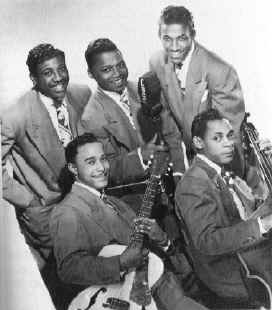
(Top Left to Right) Alexander Sharp, George Nelson
and Sonny Til)
(Bottom Left to Right) Tommy Gaither and Johnny Reed)
Emerging out of the Washington D.C. area the Clovers were the
must sucessful R&B group of the 50s.
Members:
Sonny Til - lead - real name Earlington
Tilghman
George Nelson - second tenor
Alexander Sharp - tenor
Johnny Reed - bass
Tommy Gaither - guitar
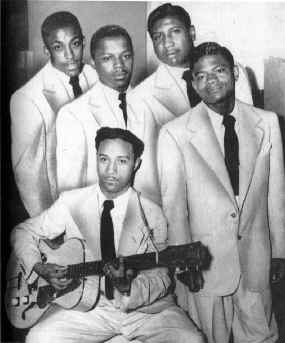
The Vibra-Naires 1948
Top row L to R: Sonny Til George Nelson, Alex Sharp, Richard
Williams
Sitting: Tommy Gaither
Photo courtesy Afro-American
Newspapers
The Orioles formed in Baltimore Maryland in 1946 are cited by
many as the first R&B vocal group and the precursor of the
doo wop sound. As teens they were known as the Vibra-Naires and
were manage by Deborah Chessler a local songwriter who would
write many of their hits. Chessler got them a spot on Arthur
Godfrey's talent scouts. Though they didn't win they became
regulars on the show.
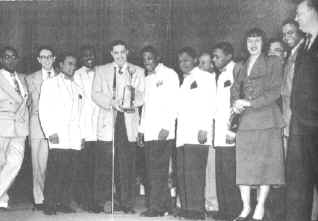
At the Apollo Theater 1950
Deborah Chessler is on the right
Photo courtesy Afro-American
Newspapers
In 1948 they joined It's A Natural Records and changed their
name to The Orioles after recording "It's Too Soon To
Know" which went to #1 R&B chart and #13 Pop
chart. It was the first black sounding record to place that
high on the Pop chart. Other hits included "Lonely
Christmas' and "Tell Me SO" in 1949. "Tell
Me So" was important because it use a wordless
falsetto doing a kind of obbligato to the lead vocal.. This would
become a staple of the doo wop style. Other hits were "A
Kiss And A Rose", "Forgive And Forget", and
"What Are You Doing New Year's Eve."
In 1953 the group recorded "Crying In The Chapel"
feature a unmistakably back sound, with emotional singing,
wordless falsetto and other vocal backings that reflected a
trend toward a gospel style that other groups were
using. It was one of the first R&B songs to crossover
to the Pop market. 1954's "In The Mission Of St.
Augustine" was the groups last hit.
The Orioles were inducted in the Rock and Roll
Hall of Fame in 1995 as an early influence.
Vocal
Group Hall of Fame: The Orioles
Dominoes
Dominoes
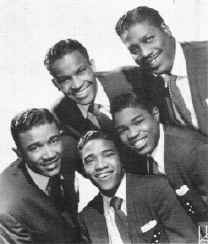
Clockwise from to right
Bill Brown, Charlie White, Clyde McPhatter, Joe
Lamont, Billy Ward
|
Billy
Ward and His Dominoes
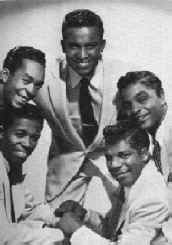
Top middle: Billy Ward
Top right: Jackie Wilson
|
Billy Ward and His Dominoes were the first
black male vocal group to master the smooth style of older groups
such as the Ravens and the hard rocking rhythm and blues.
Members:
Clyde McPhatter - lead - replaced by Jackie
Wilson in 1953 replaced by Eugene Mumford
Charlie Wilson - second tenor - replaced by
James Van Loan in 1952
Joe Lamont - baritone
Bill Brown - bass - replaced by David McNeil
in 1951 replaced by Cliff Givens 1953
Billy Ward - piano
Members 1960:
Maurice Powell - first tenor
Robbie Robinson - second tenor
Milton Merle - baritone
Cliff Givens - bass
The Group was founded in New York in 1950. Clyde
McPhatter joined as lead tenor in 1950. In 1951 the group had
three top ten R&B singles: "Do Something For Me",
"I Am With You", and "Sixty Minute Man".
Sixty-Minute Man with it's sexual innuendoes was
both a R&B and pop hit. It was on of the first, if not the
first, record by a black group to make the pop charts. They had
several hits such as "The Bells", "I'd Be
Satisfied", and "These Foolish Things Remind Me
Of You" before McPhatter left to form The Drifters. Jackie
Wilson replaced McPhatter and sang lead on "Rags To
Riches". A switch to Decca Records brought the group its
biggest hit "St. Therese of the Roses".
Vocal
Group Hall of Fame: Billy Ward and His Dominoes
Clovers
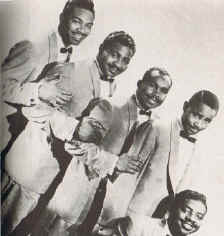
L to R: Harold Lucas, Matthew McQuarter,
John Bailey, Harold Winley, Bill Harris
Considered one of the first rhythm and blues groups to
cross over into rock and roll, the Clovers were certainly central
in forming both styles of music. Their easily identifiable was
sound was based on a combination of blues and gospel. The Clovers
did not follow the "pop" singing style of the Mills
Brothers or the Ink Spots and sounded distinctly different from
the Orioles and the Larks, rhythm and blue's first role models.
Members:
John "Buddy" Bailey - dual lead
tenor
Billy Mitchell - dual lead tenor
Matthew McQuater - second tenor
Harold Winley - bass
Bill Harris - guitarist
Considered one of the first rhythm and blues
groups to cross over into rock and roll, the Clovers were
certainly central in forming both styles of music. Their easily
identifiable was sound was based on a combination of blues and
gospel. The Clovers did not follow the "pop" singing
style of the Mills Brothers or the Ink Spots and sounded
distinctly different from the Orioles and the Larks, rhythm and
blue's first role models.
The Clovers started as a trio of Armstrong High
School students in 1946 all from the same neighborhood in
Washington, D.C. The leader of the group Harold "Hal"
Lucas, sang baritone. From 1946 through 1949 the group went
through many personal changes as they performed in several of the
area's small nightclubs. In 1950, they were heard by Lou Kreftz,
a local music dealer, while performing at the Rose Club. He got
them a recording contract with Rainbow Records, a small New York
label, but only one record was released in 1950. In February 1951
they signed with Atlantic Records, where they stayed for seven
years. Their first Atlantic release was "Don't You Know That
I Love You So," which sold a quarter million copies.The
follow up, "Fool, Fool, Fool" did even better selling a
half million copies and "One Mint Julip" almost went
gold. Of their first nine records at Atlantic, three were number
one rhythm and blues hits, three reached number two and two went
to number three.
In 1952 the group consisted of John
"Buddy" Bailey (first tenor), Mathew McQuarter (2nd
tenor), Harold Jerome Winley (bass), and Bill Harris (guitar). In
September 1952 Bailey was drafted, and was replaced first by John
Phillip and then Charlie White, who had been an original member
of the Dominoes and the Checkers. In 1953 Billy Mitchell, who had
been a solo artist at Atlantic, became the lead tenor. When
Bailey returned from Korea in May, 1954 he alternated with
Mitchell and the group expanded to six members.
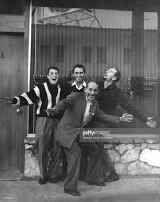
Front: Clovers' manager Lou Krefetz
Back L to R: Jerry Leiber, Lester Sill, Mike Stoller
Their peak year was 1952 with five songs in the
national rhythm and blues top ten, but had hits for Atlantic
until 1957. Their last hit was "Love Potion #9" for
United Artist in 1959. By the early 1960s the group had disbanded
with two new groups of Clovers, one led by Bailey and one led by
Lucas, touring the country. The Lucas group continued to perform
in clubs into the 1970s.
The Clover's sound was heavy on the bottom. Both
the vocal group and and the instrumental backing employed an
accentuated bass line. No distinctive lead tenor carried the
group; rather, it was a blending of all the voices over a varied
mixture of drums, saxophone, and piano that gave the recordings
by the group the warm feel of warmth even on the up-tempo
numbers.
Few rhythm and blues groups in this period
could claim the popularity and longevity of the Clovers. While
the Dominoes and the Orioles opted for the "better"
clubs and hotels, the Clovers stayed within the Black community,
becoming "their" vocal group more than any other at
this time.
Vocal Group
Hall of Fame: The Clovers
Swallows
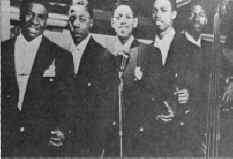
Left to Right: Earl Hurley, Fredeick
Johnson, Eddie Rich, Norris mack and Herman Denby
The Swallows are a favorite among collectors of early rhythm and
blues records
Members:
Eddie Rich - lead
Herman Denby - baritone/lead
Earl Hurley - second tenor
Fred Johnson - baritone
Norris Mack - bass
The Swallows were an American R&B group. They
are best known for their1951 recording of "Will You Be
Mine", which appeared in the US Billboard R&B chart.
Founded in Baltimore, Maryland, United States, in 1946 as
"TheOakaleers", the original members were Lawrence
Coxson (lead tenor),Irving Turner (tenor and baritone), Earl
Hurley (first and second tenor and bongos) and Norris
"Bunky" Mack (bass, piano, guitar, anddrums). The
'Oakaleers' practised on street corners until around 1948,when
they joined with Eddie Rich (first tenor) and Frederick
“Money Guitar” Johnson (baritone and guitar). Second
tenor and baritoneHerman "Junior" Denby was hired
later. Irving Turner stopped singing with the group, but was kept
on as valet (and occasional fill-in).
The Swallows' recording of "Will You Be Mine" was
released in 1951, and was one of the first doo-wop hits.
"Will You Be Mine" reached a peak position of Number 9
on the US Billboard R&B chart. In 1952, the Swallows released
"Beside You", which became their second national hit,
peaking at Number 10 on the Billboard R&B chart. More single
releases failed to reach these successes, however "It Ain't
the Meat (It's the Motion)," the raunchy B-side of their
third single, was a big seller in Georgia and the Carolinas.
Eddie Rich noted of the song, "[Although] everybody liked it
everywhere… you couldn’t play it. The[y] blackballed us
on that."
Herman "Junior" Denby died on July 14, 2013, in West
Chester Township, Butler County, Ohio, from pneumonia and
Alzheimer's disease. He was aged 82
Vocal
Group Harmony Web Site













